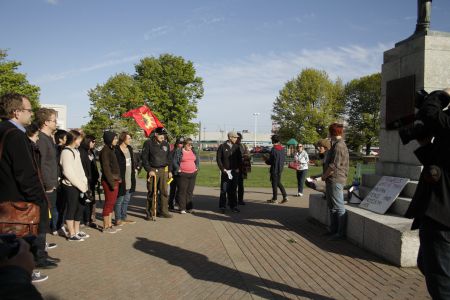K'JIPUKTUK (HALIFAX) - Whether Cornwallis Park should be renamed and the statue of Edward Cornwallis removed was a heavily debated topic yesterday.
The discussion was triggered by an open house meeting held at the Westin hotel by councillor for the peninsula-south-downtown, Waye Mason, to discuss plans for the rejuvenation of Cornwallis Park.
The name and statue issue was brought forward by members of the Nova Scotia Public Interest Research Group (NSPIRG) in a meeting held at the Cornwallis Park, an hour before the open house. NSPIRG is a group of community members and students at Dalhousie University that focus on social and environmental issues.
A little over a dozen people showed up for the meeting in the park. Guest speakers were Billy Lewis, a Mi’kmaq elder and Ben Sichel who is a member of ‘Solidarity Halifax’ and wrote about the campaign for renaming the Cornwallis Junior High School in 2011.
Concerns were voiced about what the statue represents as part of the genocidal and colonial history. “Our history as settlers here is really bound up with the history of aboriginal people. So learning about aboriginal history is learning about the relationship between settlers and aboriginal people.” Ben Sichel told the small crowd of people,
“We need to acknowledge our own history as settlers. We need to recognize that the statue is an honorific here.”
Edward Cornwallis is the founder of Halifax. He issued a scalping proclamation in 1749, which offered a bounty to whoever killed a Mi’kmaq person. This is not mentioned on the plaque that explains who Cornwallis was. The bounty is the main reason why many want his name and statue removed from the park.
When the discussion at the park ended, people headed to the Westin hotel to attend the public meeting.
Initially some of the Mi’kmaq community members were stopped at the entrance doors of the Westin hotel and were refused entry into the hotel by security.
David Ladouceur, a member of the Mi’kmaq community, who was stopped by security along with Billy Lewis said, “They told us it was private property and won’t allow me to come in. I stated and said that there is a public meeting going on and we are entitled to go to the public meeting. But they refused to let me and Billy in. I asked why and he [security] stated that management told them that I’m not allowed to come in.”
It was only after Waye Mason’s constituency coordinator, Lynn Matheson, went down to talk to the hotel management that all were allowed entry into the hotel.
Mason apologized in his opening speech saying, “The municipality and all these people are all beneficiaries of peace and friendship treaties with the Mi’kmaq. I extend to the Mi’kmaq people my respect and desire to build strong relationship in spirit intended by these treaties despite a very disappointing start to this meeting downstairs for which I apologize wholeheartedly. I am so sorry about that.”
Mason went on to say that although the issues around the name of the park and the statue were important ones to discuss, this meeting was not about that. “I think the appropriate way to talk about the decolonization of the park that way is to reach out to say the Mi’kmaq Friendship Centre and actually talk to Chief Morley and people who represented those groups and have a formal conversation with them. I didn’t invite them today because I was planning on talking about the physical state of the park.”
$2.2-million over five years has been set aside to rejuvenate the park.
A redesigned children’s playground, a performance area, widening of the sidewalks on Hollis Street and the creation of a traditional civic square, were some of the plans presented by landscape architect, Carol Roberts.
During the discussions Mi’kmaq representation in the park was brought up many times.
“We have to have a much broader conversation than we are able to have tonight and we are going to have that conversation but I have got to figure out a way to do that to make sure that everybody is properly represented.” Mason after the open house ended.



